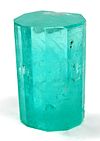Ruana: Difference between revisions
Cassiopeia (talk | contribs) m Reverted edits by 165.111.2.201 (talk): unexplained page blanking (HG) (3.3.3) |
m Disambiguating links to Antioquia (link changed to Antioquia Department) using DisamAssist. |
||
| Line 1: | Line 1: | ||
[[File:Ruana.JPG|200px|thumbnail|right|A handmade Ruana of yarn exhibited at the National and International Poncho Festival.]] |
[[File:Ruana.JPG|200px|thumbnail|right|A handmade Ruana of yarn exhibited at the National and International Poncho Festival.]] |
||
A '''ruana''' is a [[poncho]]-style outer garment typical of the [[Andes]] region of [[Venezuela]] and [[Colombia]], particularly in the [[Boyacá department]] and [[Antioquia]]. According to [[ProColombia]] (former Proexport),the official Colombian agency in charge of international tourism, foreign investment, and non-traditional exports, the word ruana comes from the [[Chibcha language|Chibcha]] ''ruana'' meaning "Land of Blankets," used to refer to the woolen fabrics manufactured by the [[Muisca people|Muisca]] natives.<ref>[http://www.colombia.travel/en/international-tourist/sightseeing-what-to-do/history-and-tradition/handicrafts/colombian-textile-work/ruana Proexport. 'Retrieved December 2, 2011']</ref> |
A '''ruana''' is a [[poncho]]-style outer garment typical of the [[Andes]] region of [[Venezuela]] and [[Colombia]], particularly in the [[Boyacá department]] and [[Antioquia Department|Antioquia]]. According to [[ProColombia]] (former Proexport),the official Colombian agency in charge of international tourism, foreign investment, and non-traditional exports, the word ruana comes from the [[Chibcha language|Chibcha]] ''ruana'' meaning "Land of Blankets," used to refer to the woolen fabrics manufactured by the [[Muisca people|Muisca]] natives.<ref>[http://www.colombia.travel/en/international-tourist/sightseeing-what-to-do/history-and-tradition/handicrafts/colombian-textile-work/ruana Proexport. 'Retrieved December 2, 2011']</ref> |
||
Similar to other poncho-like garments in [[Latin America]], a ruana is basically a very thick, soft and sleeveless square or rectangular blanket with an opening in the center for the head to go through with a slit down the front to the hem. A ruana may or may not come with a hood to cover the head. |
Similar to other poncho-like garments in [[Latin America]], a ruana is basically a very thick, soft and sleeveless square or rectangular blanket with an opening in the center for the head to go through with a slit down the front to the hem. A ruana may or may not come with a hood to cover the head. |
||
Revision as of 22:33, 18 January 2018

A ruana is a poncho-style outer garment typical of the Andes region of Venezuela and Colombia, particularly in the Boyacá department and Antioquia. According to ProColombia (former Proexport),the official Colombian agency in charge of international tourism, foreign investment, and non-traditional exports, the word ruana comes from the Chibcha ruana meaning "Land of Blankets," used to refer to the woolen fabrics manufactured by the Muisca natives.[1]
Similar to other poncho-like garments in Latin America, a ruana is basically a very thick, soft and sleeveless square or rectangular blanket with an opening in the center for the head to go through with a slit down the front to the hem. A ruana may or may not come with a hood to cover the head.
The ruanas worn by the native Muisca were apparently made of wool and knee-long, well-suited to the cold temperatures of the region where they were used not only as a piece of garment but also as a blanket for use in bed or to sit on as a cushion of sorts. Many ruanas are handcrafted with sheep’s virgin wool. An 1856 watercolor shows an indigenous man in the Cordillera Occidental of Colombia weaving a ruana using a large foot-pedaled loom.[2]
See also
References
- ^ Proexport. 'Retrieved December 2, 2011'
- ^ Paz, Manuel María. "Poncho Weaver in Cali, Province of Buenaventura". World Digital Library. Retrieved 2014-05-21.

